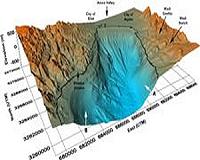| . |  |
. |
Istanbul (AFP) March 23, 2011 Franco-Turkish researchers have found that a deadly 1999 earthquake in Turkey was preceded by seismic signals, raising hopes of a predictive system for future tremors as Japan reels from its disaster. Studying copious data from the period just before the quake hit Turkey's northwestern Kocaeli province on August 17, 1999, the seismologists discovered what they dubbed a "preparatory phase" lasting 44 minutes. "This is a very special seismic signal, corresponding to a deep and slow sliding of the fault, a vibration that goes on for 44 minutes," said team member Michel Bouchon, research director at the National Centre for Scientific Research, France (CNRS). "This trend continued until the earthquake, increasing its intensity," he told AFP. The earthquake, which measured 7.6 on the Richter scale, devastated Turkey's most industrialised region, including some suburbs of Istanbul, and killed some 20,000 people. The voluminous data on the quake had previously prevented the discovery of the seismic signals of the preparatory phase, Bouchon said. "One can say that abnormal activities precede nearly half of major earthquakes, suggesting the presence of a preparatory phase," he said. In the 9.0 magnitude tremor that hit Japan earlier this month, "abnormal seismic activity was detected in the two days preceding the quake," Bouchon noted. "But it was 100 kilometres (60 miles) offshore," which made it difficult to detect the warning signals, he said. Istanbul's 13 million inhabitants live in constant fear of a major earthquake, which experts say will hit Turkey's largest metropolis in the near future with a magnitude of up to 7.2. An alert 44 minutes prior to a major tremor would be critical to saving lives as it would allow people "to gather in open spaces such as parks or squares in a city like Istanbul," which is poorly prepared for seismic risks, Bouchon said. "With the means we have today, it is difficult to identify these preparatory stages. It might be possible in the future," he said, however. A preface to the research team's study published last month in the US magazine Science warned: "Scientists are eager to find clues that may tell them when large earthquakes are imminent, but whether these particular findings apply to other earthquakes remains an open question." Hayrullah Karabulut, a team member from Istanbul's Bogazici University, was equally cautious over any imminent prospect of an early warning system. "We need to check with other examples, other earthquakes before drawing any conclusions," Karabulut said. Even if the researchers conclude that their findings could apply generally to other earthquakes, that would not be sufficient to set up an alarm system for Istanbul, according to Karabulut. "The problem would still be to install high-quality seismographs deep in the Marmara Sea (an inland sea connecting the Black Sea to the Aegean Sea) for the future Istanbul quake, which would be extremely difficult," he said.
Share This Article With Planet Earth
Related Links Bringing Order To A World Of Disasters When the Earth Quakes A world of storm and tempest
 Fault-Finding Coral Reefs Can Predict the Site of Coming Earthquakes
Fault-Finding Coral Reefs Can Predict the Site of Coming EarthquakesNew York NW (SPX) Mar 23, 2011 In the wake of the devastating loss of life in Japan, the urgent question is where the next big earthquake will hit. To answer it, geologist Prof. Zvi Ben-Avraham and his doctoral student Gal Hartman of Tel Aviv University's Department of Physics and Planetary Sciences in the Raymond and Beverly Sackler Faculty of Exact Sciences are examining coral reefs and submarine canyons to detect earthquak ... read more |
|
| The content herein, unless otherwise known to be public domain, are Copyright 1995-2010 - SpaceDaily. AFP and UPI Wire Stories are copyright Agence France-Presse and United Press International. ESA Portal Reports are copyright European Space Agency. All NASA sourced material is public domain. Additional copyrights may apply in whole or part to other bona fide parties. Advertising does not imply endorsement,agreement or approval of any opinions, statements or information provided by SpaceDaily on any Web page published or hosted by SpaceDaily. Privacy Statement |